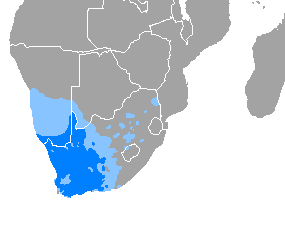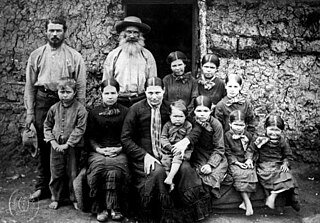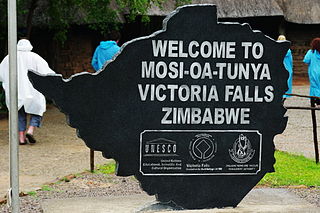
Afrikaans is a West Germanic language, spoken in South Africa, Namibia and Botswana, Zambia and Zimbabwe. It evolved from the Dutch vernacular of South Holland spoken by the predominantly Dutch settlers and enslaved population of the Dutch Cape Colony, where it gradually began to develop distinguishing characteristics in the course of the seventeenth and eighteenth centuries.

Boers are the descendants of the proto Afrikaans-speaking Free Burghers of the eastern Cape frontier in Southern Africa during the 17th, 18th, and 19th centuries. From 1652 to 1795, the Dutch East India Company controlled Dutch Cape Colony, but the United Kingdom incorporated it into the British Empire in 1806. The name of the group is derived from Trekboer then later "boer", which means "farmer" in Dutch and Afrikaans.

South African English is the set of English language dialects native to South Africans.

Cape Coloureds are a South African ethnic classification consisting primarily of persons of mixed race African, Asian and European descent.

Coloureds refers to members of multiracial ethnic communities in South Africa who may have ancestry from African, European, and Asian people. The intermixing of different races began in the Cape province of South Africa, with Dutch settlers, Bantu, and Malay slaves intermixing with the indigenous Khoi tribes of that region. Later various other European nationals also contributed to the growing mixed race people, who would later be officially classified as coloured by the apartheid government in the 1950s.

Khoekhoe are the traditionally nomadic pastoralist indigenous population of South Africa. They are often grouped with the hunter-gatherer San peoples. The designation "Khoekhoe" is actually a kare or praise address, not an ethnic endonym, but it has been used in the literature as an ethnic term for Khoe-speaking peoples of Southern Africa, particularly pastoralist groups, such as the !Ora, !Gona, Nama, Xiri and ǂNūkhoe nations. The Khokhoe were once known as Hottentots, a term now considered offensive.
This glossary of names for the British include nicknames and terms, including affectionate ones, neutral ones, and derogatory ones to describe British people, Irish People and more specifically English, Welsh, Scottish and Northern Irish people. Many of these terms may vary between offensive, derogatory, neutral and affectionate depending on a complex combination of tone, facial expression, context, usage, speaker and shared past history.

The Genootskap van Regte Afrikaners was formed on 14 August 1875 in the town of Paarl by a group of Afrikaans speakers from the current Western Cape region. From 15 January 1876 the society published a journal in Afrikaans called Die Afrikaanse Patriot as well as a number of books, including grammars, dictionaries, religious material and histories. Die Afrikaanse Patriot was succeeded in 1905 by today's Paarl newspaper.
The Afrikaner Broederbond (AB) or simply the Broederbond was an exclusively Afrikaner Calvinist and male secret society in South Africa dedicated to the advancement of the Afrikaner people. It was founded by H. J. Klopper, H. W. van der Merwe, D. H. C. du Plessis and the Rev. Jozua Naudé in 1918 as Jong Zuid Afrika until 1920, when it was renamed the Broederbond. Its influence within South African political and social life came to a climax with the 1948-1994 rule of the white supremacist National Party and its policy of apartheid, which was largely developed and implemented by Broederbond members. Between 1948 and 1994, many prominent figures of Afrikaner political, cultural, and religious life, including every leader of the South African government, were members of the Afrikaner Broederbond.
Kaffir, also spelled Cafri, is an exonym and an ethnic slur – the use of it in reference to black people being particularly common in South Africa. In Arabic, the word kāfir ("unbeliever") was originally applied to non-Muslims before becoming predominantly focused on pagan zanj who were increasingly used as slaves. During the Age of Exploration in early modern Europe, variants of the Latin term cafer were adopted in reference to non-Muslim Bantu peoples even when they were monotheistic. It was eventually used, particularly in Afrikaans, for any black person during the Apartheid and Post-Apartheid eras, closely associated with South African racism, it became a pejorative by the mid-20th century and is now considered extremely offensive hate speech. Punishing continuing use of the term was one of the concerns of the Promotion of Prevention of Unfair Discrimination Act enacted by the South African parliament in the year 2000 and it is now euphemistically addressed as the K-word in South African English.
Orkney Snork Nie was a popular Afrikaans sitcom, originally broadcast by the SABC in South Africa between 1989 and 1992. The name translates directly into Orkney Doesn't Snore, but the message being conveyed in Afrikaans is that the town isn't sleepy, there's always something happening. The series was written and directed by Willie Esterhuizen who was also involved in other popular South African series and movies. The series consists of four seasons, with two movies also produced. As of 2006, the series was rebroadcast on the Afrikaans DStv channel KykNet.
"Ag Pleez Deddy" is a South African song written and recorded by Jeremy Taylor, and released in 1962. It was written for the stage show Wait a Minim!, and has been described as the musical's "showpiece". It provides a light-hearted insight into the lives of young white working-class South Africans, whose outlook has absorbed both English-language and Afrikaans influences, along with a fascination with consumer culture. On the surface a children's song, it became broadly popular.
Afrikaner-Jews are Jewish Afrikaners. At the beginning of the 19th century, when greater freedom of religious practice was permitted in South Africa, small numbers of Ashkenazi Jews arrived from Britain and Germany. They established the first Ashkenazi Hebrew congregation in 1841. Between the end of the 19th century and 1930, large numbers of Jews began to arrive from Lithuania and Latvia. Their culture and contribution changed the character of the South African community.

Many languages are spoken, or historically have been spoken, in Zimbabwe. Since the adoption of its 2013 Constitution, Zimbabwe has 16 official languages, namely Chewa, Chibarwe, English, Kalanga, Koisan, Nambya, Ndau, Ndebele, Shangani, Shona, sign language, Sotho, Tonga, Tswana, Venda, Xhosa. The country's main languages are Shona, spoken by only 42% of the population, and Ndebele, spoken by roughly 39%. English is the country's lingua franca, used in government and business and as the main medium of instruction in schools. English is the first language of most white Zimbabweans, and is the second language of a majority of black Zimbabweans. Historically, a minority of white Zimbabweans spoke Afrikaans, Greek, Italian, Polish, and Portuguese, among other languages, while Gujarati and Hindi could be found amongst the country's Indian population. Deaf Zimbabweans commonly use one of several varieties of Zimbabwean Sign Language, with some using American Sign Language. Zimbabwean language data is based on estimates, as Zimbabwe has never conducted a census that enumerated people by language.
Elliot Josephs, better known as Zebulon Dread, is a South African cultural icon and writer. He is a controversial celebrity, known for his political views.
Boerehaat is an Afrikaans word that means "ethnic hatred of Boers" or Afrikaners as they became known after the Second Boer War. The related term Boerehater has been used to describe a person who hates, prejudices or criticises Boers or Afrikaners.
Zimbabwean English is a regional variety of English found in Zimbabwe. While the majority of Zimbabweans speak Shona (75%) and Ndebele (18%) as a first language, standard English is the primary language used in education, government, commerce and media in Zimbabwe, giving it an important role in society. Just under 5 percent of Zimbabweans are native English speakers and 89 percent of the population can speak English fluently or at a high level, second only to the Seychelles amongst African nations.
Kaaps, also known as Afrikaaps, is a West Germanic African language that evolved in the Western Cape province of South Africa. Its status as a sister language of Afrikaans or a dialect of Afrikaans is unclear. Since the early 2020s there has been a significant increase in the number of works of literature published in Kaaps. Most works in Kaaps come from authors located in the Cape Flats area of Cape Town, South Africa where it is most commonly spoken. Although Kaaps is considered a growing phenomenon, it is more specifically a colloquial dialect of Afrikaans. All other distinct colloquial variations of Afrikaans, including Kaaps, are organically connected to Standard Afrikaans as a widely spoken unitary variety and interact with it.







